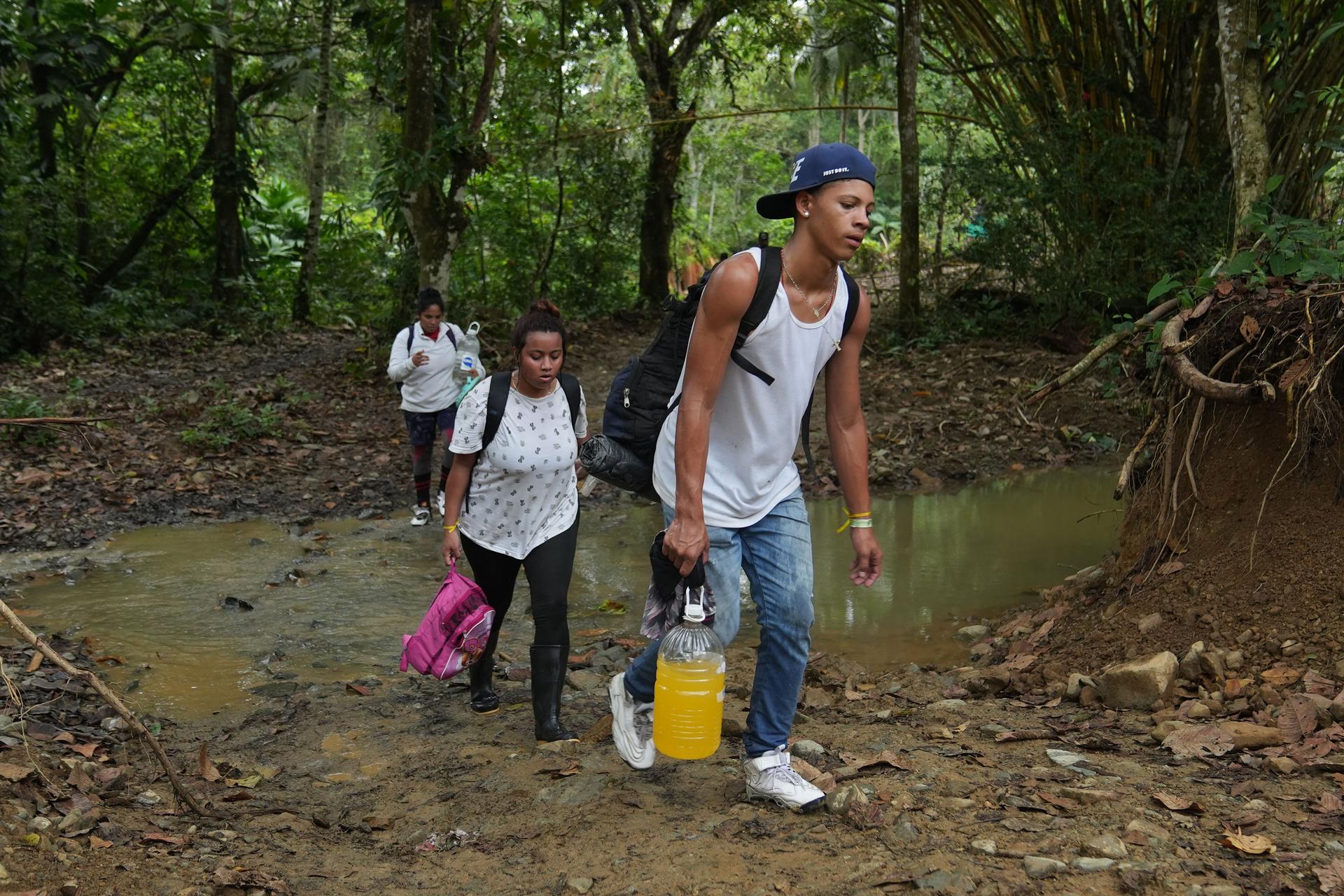‘I’ll go for the American dream’: After struggling to get legal status in Colombia, many Venezuelan migrants are heading to the US
Valentina Camacaro arrived in Colombia two years ago, hoping to escape Venezuela’s economic crisis. In April, the 21- year-old was on a dock in northern Colombia, getting ready to leave for the United States.
After strapping on a life jacket, Camacaro boarded a speedboat headed toward the Darién Gap — the dangerous jungle crossing that connects Colombia with Central America.
“I was never able to get residency papers in Colombia,” Camacaro said. “And without that, there’s no hope of getting a job that pays you decently.”

Colombia has taken in about 40% of the 7 million people who have left Venezuela in the past decade.
But over the past two years, it’s become harder for Venezuelan migrants and refugees to settle in the South American country as the administration of President Gustavo Petro slows down its efforts to regularize Venezuelan migrants.
Many of those who fail to get legal status in Colombia, and other South American countries like Peru and Chile, are now heading to the United States — where Venezuelans are one of the main groups seeking asylum at the border.

Last year, US Customs and Border Protection reported more than 430,000 arrests of Venezuelan migrants at the southern border. In 2022, the agency reported 180,000 “encounters” with Venezuelans who cross the border illegally and usually turn themselves in to seek asylum.
“There’s no way we’re going back to Venezuela,” said Claudia Perez, a street vendor in the town of Necocli, Colombia, who was also hoping to make it to the US. “I want a better life for my family. So, I’ll go for the American dream.”

In the first two months of this year, more than 46,000 Venezuelans crossed the Darién Gap.
Humanitarian groups say that South American governments, like the administration of Colombia’s President Petro, are partly responsible for this exodus across the jungle.
“Sadly, the issues of regularization and integration in Colombia appear to have taken a back seat during the Petro administration,” said Juan Pappier, deputy Americas director for Human Rights Watch.
Pappier said that under the Petro administration, Colombia shut down a small agency that worked with international donors to set up programs for Venezuelan migrants. The government also shut down health posts along the border with Venezuela.
“What we see a lot in Latin America is that governments, instead of following the best practices of their predecessors, like to distance themselves from whatever their predecessors did well,” Pappier said. “That is part of the reason why we see this [problem] in Colombia today.”
Three years ago, Colombia became a global leader in efforts to protect migrants and refugees, when then-President Ivàn Duque issued a decree that gave protected status to 1.8 million Venezuelans who were in the country at the time.
His successor, Petro, kept the policy. In small sports stadiums across the country, the government has handed thousands of residency permits to Venezuelans who arrived in the country before February of 2021.

But Petro’s government hasn’t provided documents to Venezuelans who have been arriving in Colombia without passports during the past two years.
Now, there are more than 600,000 Venezuelans in Colombia who are in the country illegally.
“We need the national government to recognize that thousands of Venezuelans are still leaving their country,” said Gisella Serrano, the director of the Mahuampi Foundation, an organization that helps migrants who arrive in Bogotà.
“If we give these people documents, they are less likely to be exploited, and perhaps, they will not head to the Darién Gap.”

Government critics say that the Petro administration has been ignoring the needs of Venezuelan migrants as it tries to improve relations with that country’s government.
“The Venezuelan government has long denied that massive numbers of people are leaving,” said Txomin Las Heras, a researcher for the Venezuela Observatory at Bogotá’s Rosario University. “Petro doesn’t want to highlight a problem that makes [Venezuelan President] Nicolás Maduro’s government uncomfortable.”
The Colombian government says that is not the case. Recently, the nation’s foreign minister, Gilberto Murillo, said that the government is drafting a bill that could grant legal status to up to 600,000 migrants from Venezuela and other countries, like Haiti.
But Murillo warned Colombia cannot do this on its own.
“To welcome more migrants, we need more resources,” he said at a press conference. “We need more help from the international community.”
With less government support, and uncertainty about their chances of getting legal status, Venezuelan migrants who are in Colombia without papers are now weighing their options.
Veronica Carvajal makes empanadas at a small bakery in Bogotá. She said she’ll stay in Colombia because her daughter is already enrolled in school here, and that gives her a better chance of getting a residency permit.

“Once I have a permit, I can try for better jobs,” Carvajal said. “Like, being a chef in a restaurant.”
But others are getting tired of waiting. They’re starting to make the long trek to the United States, where wages are much higher — even if getting a work permit can also be complicated.
